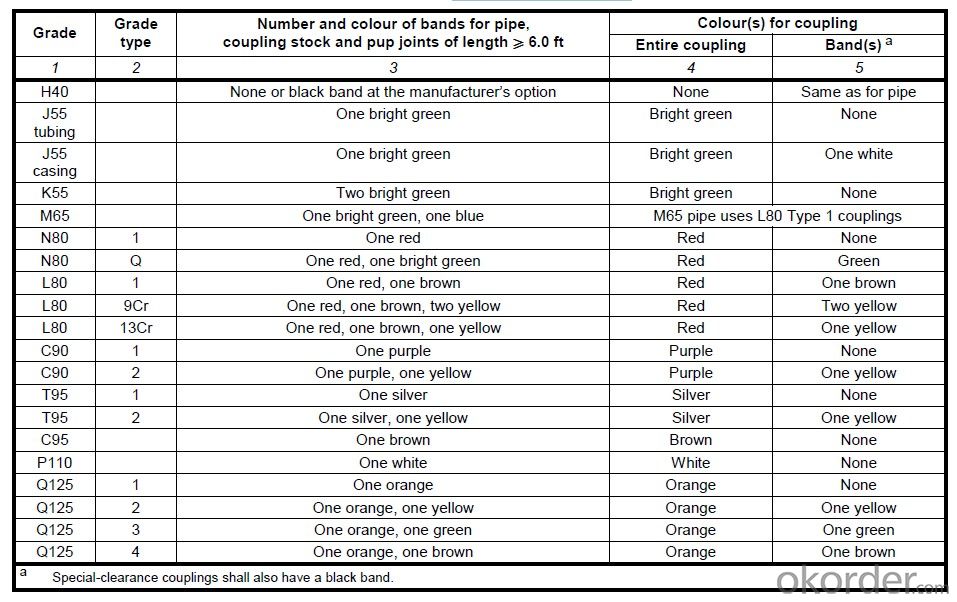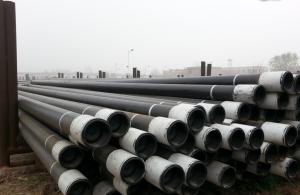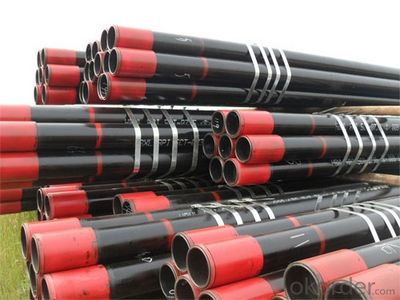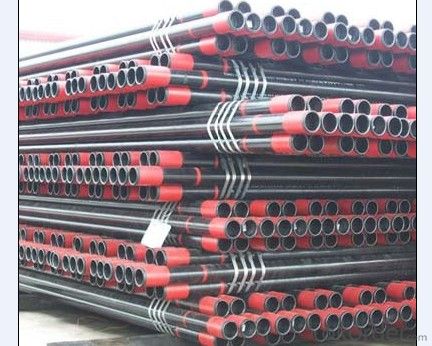Casing Pipe for water well
- Loading Port:
- China Main Port
- Payment Terms:
- TT OR LC
- Min Order Qty:
- -
- Supply Capability:
- -
OKorder Service Pledge
OKorder Financial Service
You Might Also Like
API 5CT M65 casing pipe
Our company produces M65 casing pipe strictly according to the API 5 CT standards.Dalipal Company is one of the most famous enterprises of china professionally producing pipeline and oil casing.We can supply API 5CT series of pipeline and oil casing with all kinds of specifications and materials.We have first-class production equipment and technology.
Main Specification
Grade | API 5CT M65 Casing Pipe for water well |
External thickness | “4 1/2- 20”inch, (114.30- 508.00 mm) |
Wall thickness | 5.21-16.13 mm |
Grade M65 for API threads | There are no Grade M65 couplings. Grade L80 Type 1 couplings shall be used on Grade M65 pipe. |
Function | used for protecting pipeline |
Length:
R1-(6.10m~7.32m),R2-(7.62/8.53)~10.36m,R3-(10.36/10.97~14.63m)
Certificate:
API 5CT,Russian Certificate,ISO,CCS
Packing:
Coating and steel thread protector
Oil Casing Pipe Grade colour codes

Usage:
Casing pipes are used for oil , gas and water wells. Steel casing pipes and tubing are applied to furnishing and installing cased tunnels, where they indicate to pass other utilities or obstructions without open excavation. Steel casing pipes and tube have smooth wall and a minimum yield strength of 35,000 psi. Corrosion-proofing water-based paint is applied on the outside pipe surface to protect against atmospheric corrosion during transportation and storage. The pipes can be delivered with metal or composite caps at both ends for thread protection.Casing pipes are manufactured out of steel are smelted in the electric furnace, treated with synthetic slags and cast by continuous casters. The applied steel making process ensures the achievement of chemically pure steel with reference to sulphur and phosphor contents providing high tensile, ductility and corrosion resistance properties of pipes to be operated at low temperatures in various corrosion media. Pipes are heat-treated in a computerized walking beam furnace. Steel grades and heat treatment regimes applied allow high-strength pipe to be obtained.
API Specification 5CT / ISO 11960
Hydrostatic test pressure for Grade M65 casing

We have the ability to detect the whole process. We can fully guarantee the high quality of the products.
- Q:How are steel pipes tested for quality control?
- Steel pipes are tested for quality control through various methods such as visual inspection, dimensional checks, and non-destructive testing techniques including ultrasonic testing, magnetic particle inspection, and hydrostatic pressure testing. These tests ensure that the pipes meet the required specifications, standards, and structural integrity, ensuring their quality and reliability.
- Q:Why seamless steel pipe called seamless steel pipe?
- Seamless steel pipe is a hollow section, without the joint round, square, rectangular steel. Seamless steel tubes are made of ingots or billets made by piercing and are then made by hot rolling, cold rolling or cold casting. Seamless steel pipe with a hollow section, as pipe conveying fluid, compared withsteel and roundsteelinsolid, flexural torsional strength in the same time, the weight is light, is a kind of economic section steel, widely used in the manufacture of structural parts and mechanical parts, such as the oil pipe, automobile transmission shaft, bike frame and construction using steel scaffolding.
- Q:What is the difference between steel pipes and PVC-U pipes?
- Steel pipes are made of a durable and strong material, while PVC-U pipes are made of a plastic material. Steel pipes are typically used for high-pressure and heavy-duty applications, as they can withstand harsh conditions and have a longer lifespan. PVC-U pipes, on the other hand, are lighter in weight, easier to handle, and resistant to corrosion and chemicals. They are commonly used for low-pressure applications and are more cost-effective.
- Q:Can steel pipes be used for drinking water supply?
- Yes, steel pipes can be used for drinking water supply. Steel pipes are commonly used in water distribution systems due to their strength, durability, and ability to withstand high pressures. However, it is important to note that the steel used in these pipes must be specifically designed and approved for potable water applications to ensure that it does not contaminate the water with any harmful substances. Additionally, proper maintenance and regular inspections are necessary to prevent the formation of rust or corrosion, which can affect the quality of the water.
- Q:What is the difference between hot-dip galvanizing and electroplating of steel pipes?
- Hot-dip galvanizing and electroplating are two different methods of applying a protective coating to steel pipes. Hot-dip galvanizing involves immersing the steel pipes in a bath of molten zinc, which creates a thick, durable coating that provides excellent corrosion protection. On the other hand, electroplating involves passing an electric current through a solution containing zinc ions, which causes the zinc to bond to the surface of the steel pipes. While electroplating can provide a thinner coating, it is generally less durable and may require additional layers or coatings for sufficient corrosion resistance.
- Q:What material is RHS in the steel tube?
- RHS is a rectangular hollow section steel. The RHS structure represents a rectangular hollow section steel.
- Q:How to calculate the maximum bending stress of steel pipe? Is there a list of the maximum flexural normal stresses for steel pipes of different materials and diameters?
- The maximum flexural normal stress is calculated as: Sigma =M/ (gamma x*Wnx).Of which: M is the maximum bending moment of the steel tube;Gamma X - the plastic development coefficient of the cross section; for the cross section of the steel tube, 1.15,
- Q:What's the difference between the fastener type steel pipe scaffold, the floor type steel pipe scaffold and the overhanging type steel pipe scaffold?
- Butt fastener: used for connecting two steel pipe joints.The base and the pad: is set up in the bottom of the pedestal pole, pay attention to the distinction between base and the base plate, usually with steel plate and welded steel pipe, base usually put on a backing plate, and the plate can be wood can also be plate.The foot board (see the diagram below), safety net (no explanation, this is very simple).
- Q:What materials are used in scaffolding pipes?
- Fastener warranty information should be complete, enter the site should be carried out after re sampling technology, performance shall be in accordance with provisions of the "GB15831" steel pipe scaffold fastener, before use should be individually selected, cracks, deformation, bolt slide wire is strictly prohibited.
- Q:Are steel pipes resistant to corrosion?
- Yes, steel pipes are generally resistant to corrosion due to the protective layer of oxide that forms on their surface, but their resistance can vary depending on the specific grade of steel and the environment they are exposed to.
1. Manufacturer Overview |
|
|---|---|
| Location | |
| Year Established | |
| Annual Output Value | |
| Main Markets | |
| Company Certifications | |
2. Manufacturer Certificates |
|
|---|---|
| a) Certification Name | |
| Range | |
| Reference | |
| Validity Period | |
3. Manufacturer Capability |
|
|---|---|
| a)Trade Capacity | |
| Nearest Port | |
| Export Percentage | |
| No.of Employees in Trade Department | |
| Language Spoken: | |
| b)Factory Information | |
| Factory Size: | |
| No. of Production Lines | |
| Contract Manufacturing | |
| Product Price Range | |
Send your message to us
Casing Pipe for water well
- Loading Port:
- China Main Port
- Payment Terms:
- TT OR LC
- Min Order Qty:
- -
- Supply Capability:
- -
OKorder Service Pledge
OKorder Financial Service
Similar products
New products
Hot products
Hot Searches
Related keywords































